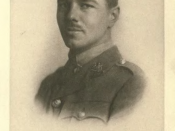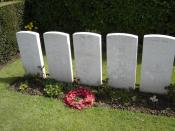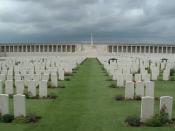English Literature Summer Project - The War Poems by Wilfred Owen (Edited by Jon Stallworthy)
Wilfred Owen was born in Oswestry on 18th March 1893. After school, he became a teaching assistant and in 1913 went to France for two years to work as a language tutor. When war broke out, he did not rush back to England immediately because he felt completely disconnected from it. Even when he visited the local hospital with a doctor friend and examined the nature of the wounds of soldiers who were arriving from the Western Front, the war still appeared to him as someone else's story. However, in 1915 he returned to England to enlist in the army and was commissioned into the Manchester Regiment. After spending the remainder of the year training in England, he left for the western front early in January 1917.
He was diagnosed with shellshock after experiencing heavy fighting and was evacuated to England to recover at Craiglockhart War Hospital near Edinburgh in June.
Here he met the poet Siegfried Sassoon, who was already a well-established poet. Sassoon agreed to look over Owen's poems, gave him encouragement and introduced him to literary figures such as Robert Graves.
He returned to France in August 1918 and in October was awarded the Military Cross for bravery. On 4th November 1918 he was killed while attempting to lead his men across the Sambre canal at Ors. The news of his death reached his parents on 11 November, Armistice Day. He felt he needed to show the 'Pity of War' and speak for the men in his care, these views were also shared by Sassoon.
Some of his most famous poems include, "Dulce et Decorum est", "Insensibility", "Anthem for Doomed Youth", "Futility" and "Strange Meeting".
http://www.wilfredowen.org.uk/Biography and http://www.bbc.co.uk/history/historic_figures/owen_wilfred.shtml
The War Poems
The War Poems is a book complied of all the poems Wilfred Owen wrote during his time in the First World War. These poems convey Owen's feelings towards the war and gives the reader a sense of what is was like to be a militant during conflict. His poetry is characterised by powerful descriptions of the conditions faced by soldiers in the trenches. His poems are sometimes violent and realistic, challenging earlier poetry which communicated a pro-war message. His first-hand experience of war is one reason why there is such a shift in the attitude towards war. The volume is taken from the definitive edition of Owen's work. It has been edited by Professor Jon Stallworthy, who has written an illuminating and authoritative introduction.
Dulce et Decorum Est
French troops advancing under fire during World War I
French troops advancing under fire during World War I
Bent double, like old beggars under sacks,
Knock-kneed, coughing like hags, we cursed through sludge,
Till on the haunting flares we turned our backs,
And towards our distant rest began to trudge.
Men marched asleep. Many had lost their boots,
But limped on, blood-shod. All went lame, all blind;
Drunk with fatigue; deaf even to the hoots
Of tired, outstripped Five-Nines that dropped behind.
Gas! GAS! Quick, boys! - An ecstasy of fumbling
Fitting the clumsy helmets just in time,
But someone still was yelling out and stumbling
And flound'ring like a man in fire or lime...
Dim through the misty panes and thick green light,
As under a green sea, I saw him drowning.
In all my dreams before my helpless sight
He plunges at me, guttering, choking, drowning.
If in some smothering dreams, you too could pace
Behind the wagon that we flung him in,
And watch the white eyes writhing in his face,
His hanging face, like a devil's sick of sin,
If you could hear, at every jolt, the blood/
Come gargling from the froth-corrupted lungs
Obscene as cancer, bitter as the cud
Of vile, incurable sores on innocent tongues,
My friend, you would not tell with such high zest
To children ardent for some desperate glory,
The old Lie: Dulce et decorum est
Pro patria mori.
This poem describes a gas attack on a trench in World War One. Owen imagery describes how the war changed the young men by saying, "like old beggars," This conveys to the reader how unglamorous trench life is and how the young men who were so eager to fight have now been weakened. It also shows how the war changed the young soldiers and broke them, which is similar to another one of Owen's poems, "Anthem for Doomed Youth." Owen also uses a lot of hard descriptive words such as, "coughing like hags," "marched asleep," and "limped on". These are all very hard hitting words which gives emphasis on how the men break under the stresses of war and the ways that bodies get warped by the war.
Owen also shows the reader how hard it is for the survivors of the gas attack in the line, "In all my dreamsâ¦he plunges at me." This suggests that soldiers found it hard to get the image of their friend's death out of their mind. This could be one of the reasons as to why the men, "marched asleep," they're so sadden and horrified by what has happened in the war, the remembrance physically pains them to carry on. The use of the words, "guttering, choking, drowning," gives conations of a panicking death. Owen may have used these words to shock readers back in England to what actually happened at war. Many people didn't realise that these types of weapons were being used and how painful some of these deaths were. One of Owen's goals was to educate people on how truly awful war was and that it is not a glorious patriotic duty. He uses very graphic words to describe the effects of the gas attack, "white eye writhing in his face/His hanging face," which may have been to try and scare younger men from signing up to fight. The word, "face," is used twice here which may suggest that this is the part of the body that changed and tormented soldiers the most when seeing the attacks.
The line which stood out to me the most when reading the poem was, "you would not tell with such high zest/to children ardent for some desperate glory." This shows Owen thought that the government and the public were encouraging young men to go to war for the, "desperate glory." The use of the word, "children," has a significant impact on how the poem could change the minds of people reading the poem at home. It suggests that the men signing up are far too young for war, it takes their innocence away from them and turns them into old men, which is referenced at the start of the poem. Owen believed it was a waste of young lives and the men were being lured away from the safety of England to this disturbing war. The final line, "The old lie: Dulce et decorum est Pro patria mori," ties in with the title. It means, "It is a sweet and honourable to die for your country." This is a concept denied by Owen and many other poets such as Sassoon.
I think the use of the gas attacks represents two things. Firstly, it represents the other uses of weapons in the war that people back home may not know of. However, I think the main use of the gas attack is to represent how disillusioned and foggy the soldiers have become to the war. Due to the horrors they've seen and the long duration in which they've been there, they've forgotten why they're fighting so their memory is foggy as well as their environment from the gas attack.
About the Poem
This poem was drafted in Craiglockhart, the psychiatric hospital Owen was treated in for shellshock. It was here he met Sassoon, who helped him focus his ideas and feelings on war into his poetry. It was also in Craiglockhart that his doctor, Arthur Brock, encouraged Owen to translate his experiences, specifically the experiences he relived in his dreams, into poetry.
Amber Castle


